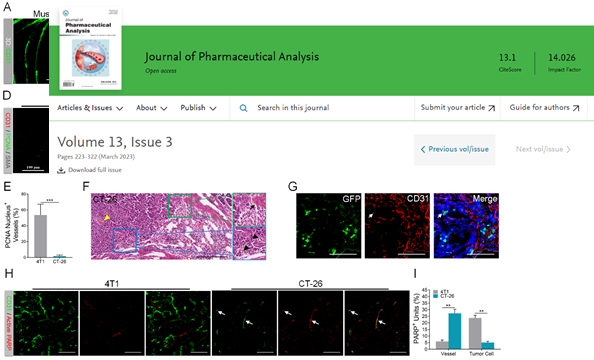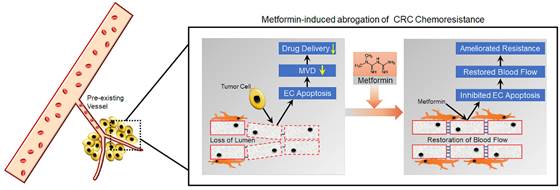In March 2023, Department of Vascular Surgery of the First Affiliated Hospital (FAH) of Xi’an Jiaotong University (XJTU) published an original article entitled "Overcoming chemoresistance in non-angiogenic colorectal cancer by metformin via inhibiting endothelial apoptosis and vascular immaturity" in ournal of Pharmaceutical Analysis (IF: 14.026) as a Cover Article. Li Guangyue, a doctoral student, and Zhang Shuliang, a postgraduate student from FAH are the co-first authors. Professor Lu Shaoying and Associate Research Professor Wang Jichang from Department of Vascular Surgery are the co-corresponding authors.

In this study, in situ transplanted colorectal cancer (CRC) mouse model was established to illustrate vasculature characteristics of non-angiogenic CRC from the perspectives of vascular maturity, vascular leakage and parietal cell coating, etc. It was found that CT-26 cancer grew in a non-angiogenic pattern of "vessel co-option" and a large quantity of vascular endothelial cells were undergoing apoptosis (CD31+cleaved-PARP+) after in situ transplantation into the rectal mucosa. Although sensitive to various chemotherapeutic drugs in vitro, CRC cells respond poorly in vivo, suggesting that an in vivo mechanism underlying chemoresistance might exist. Moreover, metformin increased the microvessel density (perfused vessels), improved the vascular maturity, and significantly mediated chemosensitizationin vivo. However, this effect was independent of direct increase of drug toxicity.

CD31/PCNA immunofluorescence and transcriptome sequencing found that the increase of microvessel density mediated by metformin was not associated with proliferation and angiogenesis, whereas correlated with the inhibited endothelial cell apoptosis (CD31+cl-Caspase-9+). This phenomenon was also confirmed in human CRC tissue samples. Finally, in vitro co-culture model of tumor cells and endothelial cells demonstrated that CRC cells could directly induce the death of endothelial cells in the co-culture system, but the death of endothelial cells was significantly inhibited by metformin.

The findings in this study firstly reveal that the mechanism of CRC chemoresistance in vivo is associated with whether its growth depends on angiogenesis and whether tumor cells induce endothelial cell apoptosis. Metformin, a first-line antidiabetic agent, can induce chemosensitization by suppressing the apoptosis of CRC vascular endothelial cells, increasingthe tumor vascular density and improving vascular maturity, which will provide novel therapeutic targets and ideas for clinical treatment.